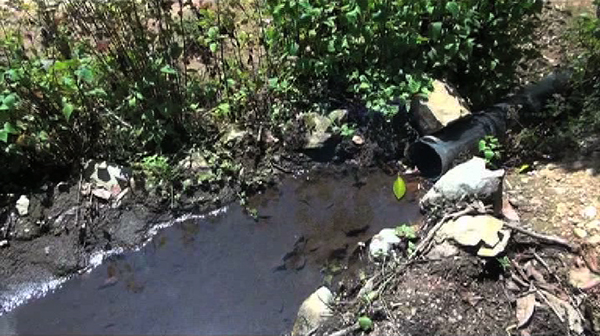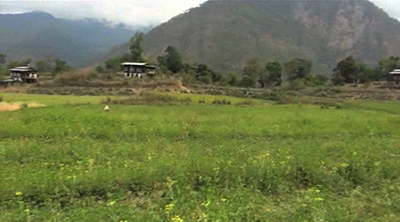 Despite having the favourable climate to grow almost all kind of agriculture products, Oleps of Athang Gewog in Wangdue Phodrang leave almost ten acres of land fallow annually due to the shortage of irrigation water supply in their village.
Despite having the favourable climate to grow almost all kind of agriculture products, Oleps of Athang Gewog in Wangdue Phodrang leave almost ten acres of land fallow annually due to the shortage of irrigation water supply in their village.
Today, the twenty households of Oleps in Rookha village share the irrigation water from a small pond. The pond above their village is a reservoir tank for them to supply water on a rotation basis. But they say this trend always leaves them dissatisfied due to insufficient water for their paddy works, paddy being a plant solely dependent on water.
As per the locals they have to wait for their turn to get water, but an overnight water supply in their field is not sufficient enough to carry out their whole paddy works. They individually do their paddy cultivation works about 50 decimals to few acres of lands and it is a staple crop for the Oleps. According to villagers, though they have enough lands, they cannot utilize it all due to insufficient water.
“In my field, I do paddy cultivation works only when there is rain. But it’s always risky to depend on it. I couldn’t even cultivate wheat this time due to insufficient water. The water that we have today becomes smaller in the spring season and cannot afford to grow any crops. For example, I have planted some maize, but now it’s gradually dying because of no water,” said Tsagay from Rookha Village, Athang Gewog, WangduePhodrang.
 “We can do our paddy cultivation works on time when there is rain. But I couldn’t finish the cultivation works on time last year due to no water. We have finished only towards the end of the 6th Month of Bhutanese calendar. I feel we cannot maintain self-reliance if there is no irrigational water. We have suitable land and has the potential to grow everything if we have water here,” Bakhum from the same village added.
“We can do our paddy cultivation works on time when there is rain. But I couldn’t finish the cultivation works on time last year due to no water. We have finished only towards the end of the 6th Month of Bhutanese calendar. I feel we cannot maintain self-reliance if there is no irrigational water. We have suitable land and has the potential to grow everything if we have water here,” Bakhum from the same village added.
“Actually, I have around five acres of land, but I have only about 50 decimals of wetland because of insufficient irrigation water. We even find tough to handle this amount of paddy field due to lack of water,” said Chokila from the same village.
Villagers also say late paddy cultivation work affects the yield at the end. They say monsoon is an unpredictable season, but they find no other options to leave this trend.
According to the gewog administration, the present water source at Pharichu which is about five km away from the village was once renovated, but could not bring any change due to lack of other water sources.
“We could not include in the plan since the required budget was found beyond the gewog’s capacity. However, we are expecting help from the government’s priority. On the other hand, we also expect to solve the problem if we get a block grant from the government in the second fiscal year of the 12th FYP,” Khandu Dorji, the gup of Athang Gewog shared.
He also said the dzongkhag officials carried out the preliminary water source inspections, but could not succeed. However, the gup says the gewog administration will try to prioritize in the second fiscal year of the twelfth five-year plan.
Till then, Oleps will have no other option than to follow the present culture of paddy cultivation works.









